11 Tips To Walk off 10 Pounds
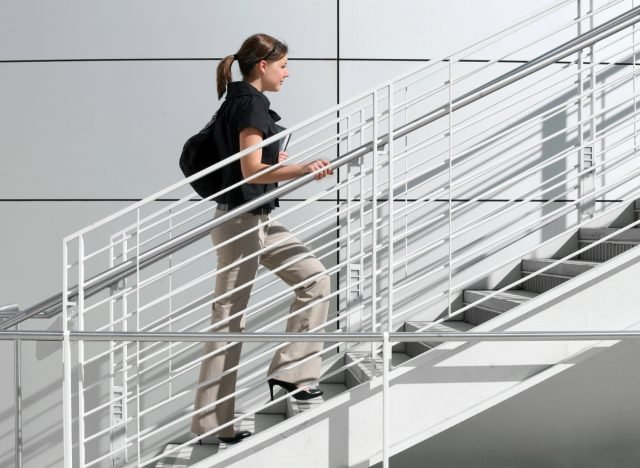
Losing 10 pounds is an ambitious fitness goal for many individuals, especially when preparing for warm weather and beach season. If it’s on your to-do list, why not consider walking it off? (And we mean that in the literal sense!) We have 11 expert tips to walk off 10 pounds you’re sure to find useful in your regular cardio routine. And while you’re burning off unwanted calories, you’re also giving your health and wellness a solid boost.
The key to successful weight loss is establishing a calorie deficit, which means torching more calories than you consume. “By adding walking to your routine, you are incorporating a low-impact way to increase the number of calories you burn, meaning you can eat slightly more food in that same day while maintaining a similar caloric deficit,” explains Jordan Fernandez, CPT at Trainer Academy. “Alternatively, walking could increase [your weight-loss rate if you keep] your calorie intake the same.”
Now, let’s get into the best tips to walk off 10 pounds.
Opt for the stairs.
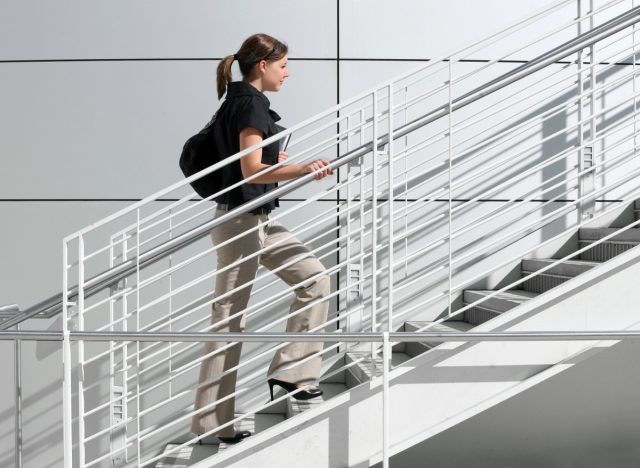
Whenever you can choose the stairs instead of an elevator, go for it. Although it might take longer to reach your destination, it will help you reach your weight-loss goal faster.
“Walking up the stairs can make you feel uncomfortable and out of breath, but that’s because it’s demanding on your body,” explains Domenic Angelino, CPT at Trainer Academy. “This high demand results in you burning a ton of extra calories.”
Pick up the pace.

The faster you walk, the more calories you’ll burn. So, pick up the pace whenever you have the energy to do so!
“The amount of calories you burn while walking will have a pretty linear relationship with your walking speed,” Angelino tells us. “Walk faster to burn more calories … You don’t have to make it super fatiguing if you don’t want to; it’s okay to walk at a speed that doesn’t burn you out. But even just increasing your walking speed by as little as five to 10% can help you reach your goals.”
Incorporate hills whenever possible.
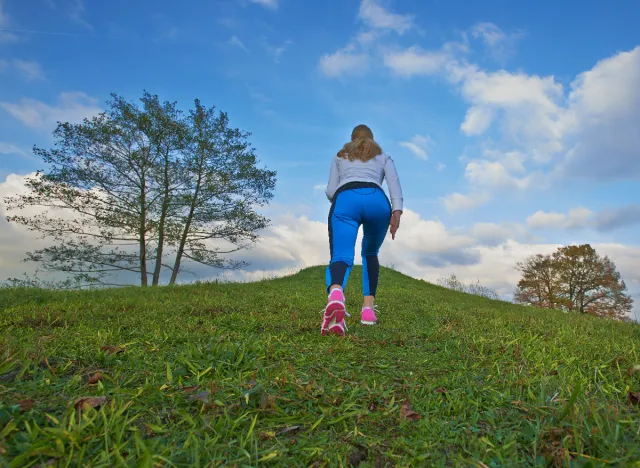
While adding hills to your walk is similar to adding stairs, it’s easy not to think of it.
“If you go on walks outside, try to pick a route with more hills if possible,” Angelino says. “It’s pretty demanding on your body. You’ll burn more calories than you otherwise would. It also helps you have natural challenges built into your walking route. You can feel accomplished when you start to overcome a big hill faster than you ever have and without being out of breath.”
Try interval walking in your rotation.
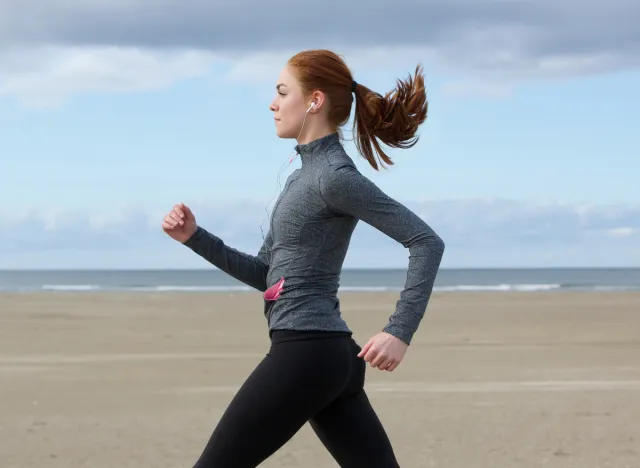
Walking the same route at the same pace can get boring, and it’s not nearly as productive as interval walking. This method involves varying the speed at which you walk, alternating between slower and quicker paces.
“Interval walking is a way to work up to faster walking speeds if you’re not comfortable with or able to walk fast consistently,” Angelino says. “Switch between walking fast and slowly until your walk is over. Eventually, you’ll get to a point where you can walk very briskly consistently without feeling the need to slow down, even on hills.”
Add a weighted vest to your walking apparel.
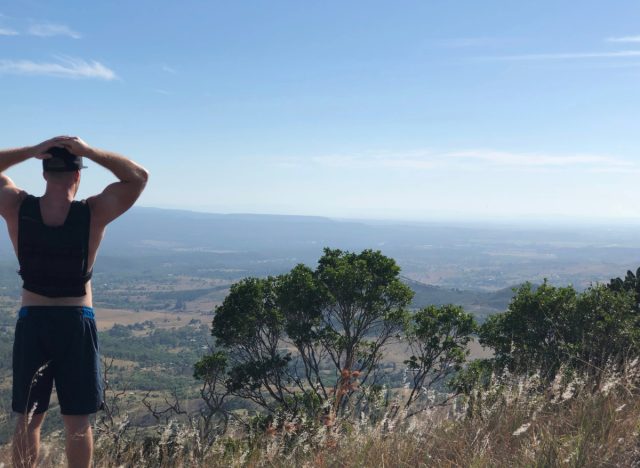
Wear a weighted vest on your walks to crush both your cardio and strength goals.
“Weighted vests are helpful in particular because they more evenly distribute weight across your upper body than other types of weight do,” Angelino points out. “This helps prevent muscular fatigue from limiting how far you can walk because many muscles are sharing the load. The weight is also going to be consistently around the center of your body, which means it’ll feel less heavy.”
Fit walking in between your workout sets.
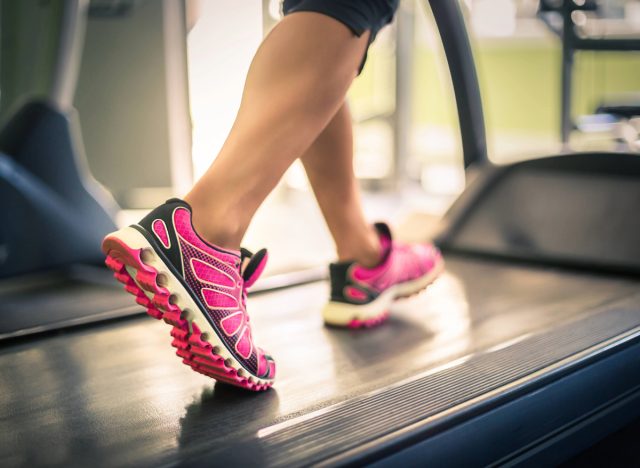
Getting in some steps between your workout sets is a great way to increase your daily step count and calorie burn. If you do it during your rest time, Angelino assures you it won’t negatively impact your recovery between sets (in almost every case). In fact, it can provide extra goodness.
“Walking can also help you recover more quickly from certain types of exercise by helping your body transport metabolites that built up in your muscles during your recent active sets,” says Angelino. “Walking between sets by pacing around is a way to make the most of the down time you’re forced to have between sets in the gym.”
Make your social plans around walking.
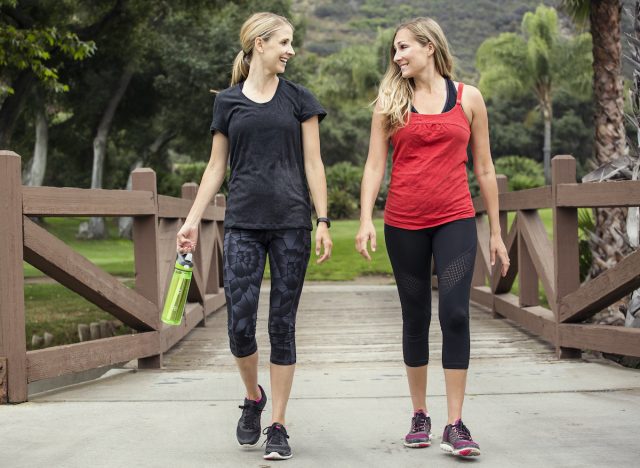
Whether you “walk and talk” to catch up with loved ones on the phone as you both walk wherever you happen to be in the world, or you plan a walk with a friend instead of grabbing brunch or drinks, you’ll have fun while getting in your steps.
“Sometimes, [finding] enough time to walk throughout the day [can be challenging]. It gets less challenging when you naturally integrate walking into your day,” explains Angelino. “Plan to have more social activities with friends that implicitly involve walking. The goal isn’t to plan to walk for exercise with a friend; the goal is to [do something that involves] more walking than other activities, such as going to the park or a convention.
Try rucking.
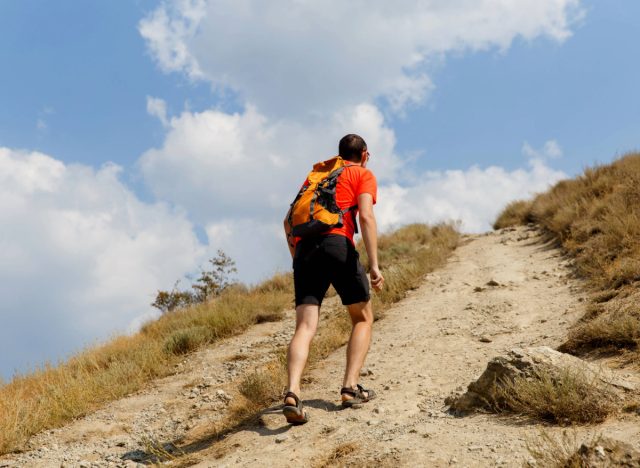
If you haven’t tried rucking before, now’s the time to do so. In fact, people on TikTok are swapping regular walks for rucking to lose weight and achieve impressive body transformations.
“Rucking involves walking while carrying a weighted backpack,” Fernandez tells us. “This adds resistance, making your body work harder and increasing the calorie burn. Start with about 10% of your body weight in the backpack and adjust as needed.”
Choose the parking spot furthest away from your errands.

Always park as far away from your destination as possible. It doesn’t sound like it would make a major difference, but every step counts.
“It might seem inconvenient or unreasonable to even consider, but it’s worth considering reframing what you want your goal to be,” Angelino points out. “You can kill two birds with one stone by finding a way to meet your daily walking goals in a way that fits with what you were planning to do anyway.”
Choose a challenging trail or route.
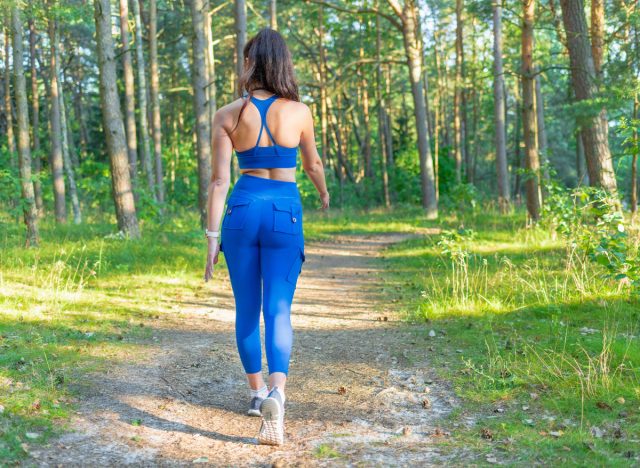
By picking the route that’s filled with hills and various surfaces, you’ll give yourself a much more productive workout.
“Opt for routes with varying terrains and inclines,” Fernandez suggests. Walking uphill, for instance, burns more calories than walking on flat ground. This not only helps with weight loss but also tones your leg muscles.”
Track your step count.

Tracking your step count can be an excellent way to challenge yourself and encourage yourself to do a little more each week.
“Tracking your steps gives you a way to quantify just how much you’re actually walking,” says Angelino. “It also helps you become more aware of your own walking habits since you’ll naturally learn how much walking is involved in different activities you do during the day. It can also help gamify exercise a bit. A common target is to aim for 10,000 steps a day.”





